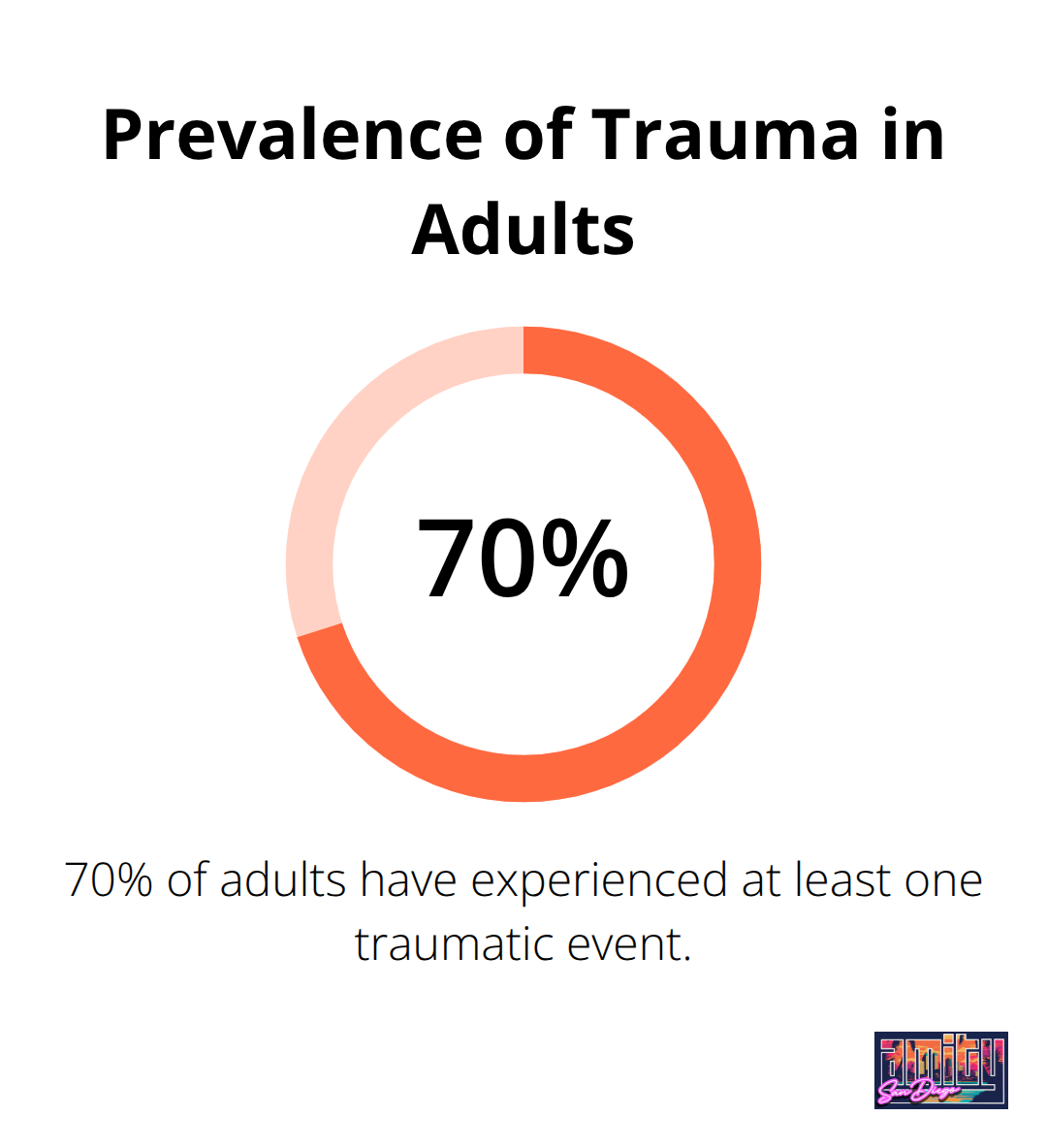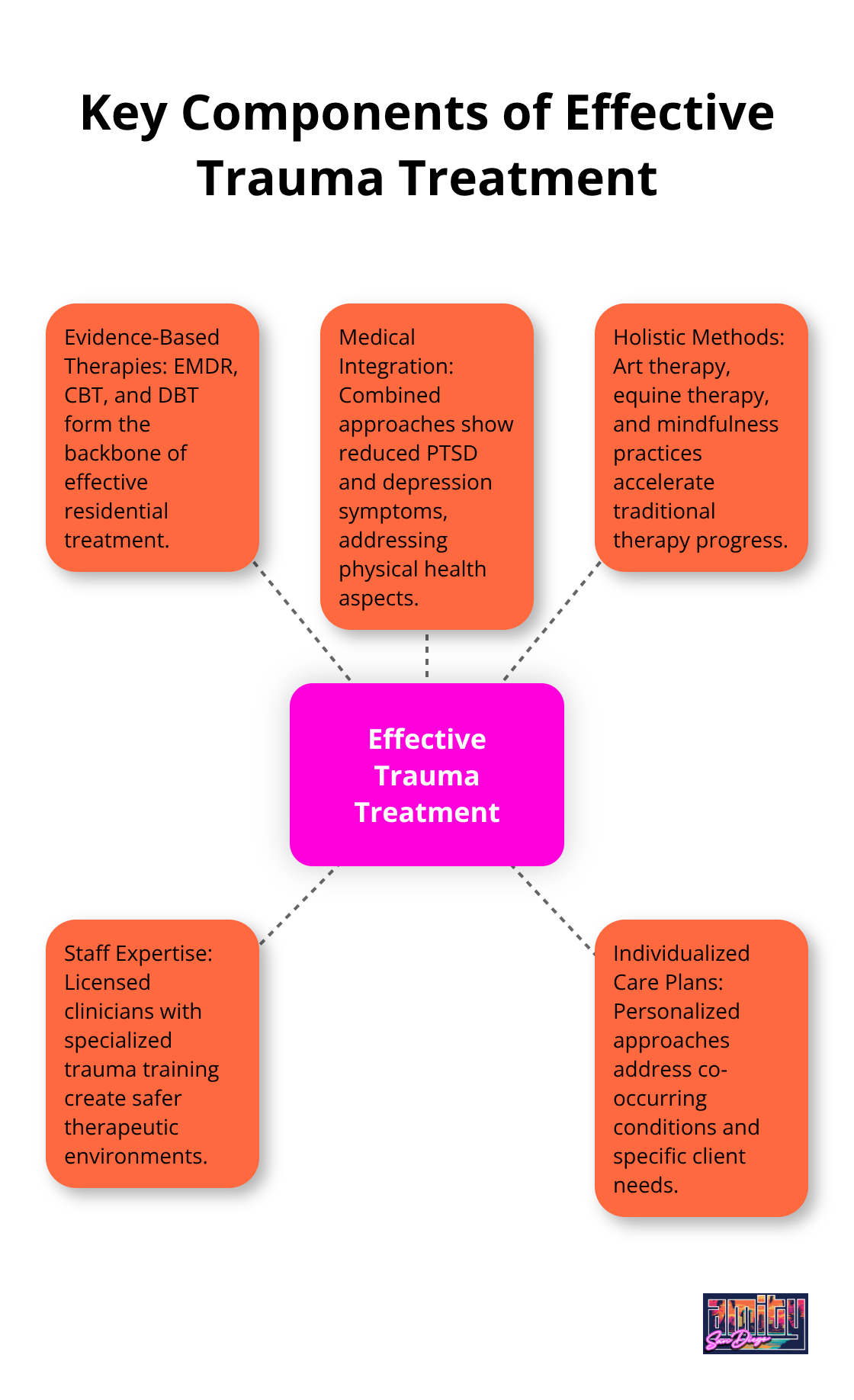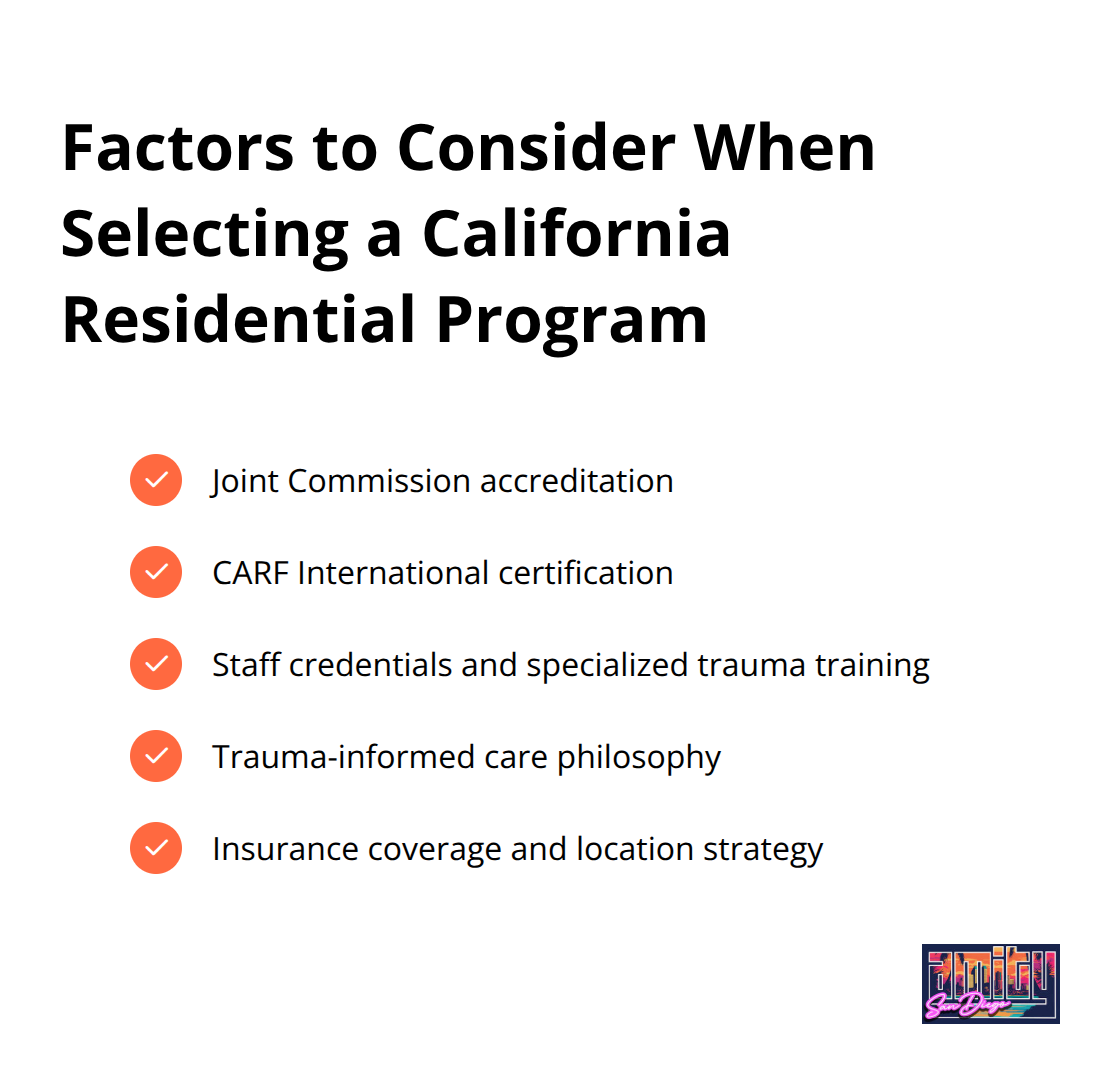Trauma affects millions of Americans, with studies showing that 70% of adults have experienced at least one traumatic event. California leads the nation in providing comprehensive residential trauma treatment programs.
We at Amity San Diego understand that finding the right program can feel overwhelming when you’re already struggling with trauma’s effects. The right residential facility makes the difference between temporary relief and lasting recovery.

What Types of Residential Programs Handle Complex Trauma
California’s residential trauma treatment landscape offers three primary program models, each addressing different aspects of healing. Trauma-informed care programs represent the gold standard, with facilities implementing the National Child Traumatic Stress Network’s six core principles: safety, trustworthiness, peer support, collaboration, empowerment, and cultural humility. These programs restructure their entire environment around trauma awareness, with graduates reporting improved emotional regulation according to SAMHSA data.
Specialized PTSD and Complex Trauma Programs
Programs that target PTSD and complex trauma use intensive evidence-based protocols that last 90-120 days. Veterans Affairs research shows that residential PTSD programs achieve significant symptom reduction rates, with higher PTSD symptom severity and early program discharge associated with lower odds of improvement, while longer treatment duration correlates with better outcomes. Complex trauma programs specifically address developmental trauma, with facilities like The Meadows reporting that clients with childhood trauma require longer treatment duration but show comparable recovery outcomes when given adequate time.
Gender-Specific and Population-Focused Options
Women-only residential programs demonstrate higher completion rates than co-ed facilities, with women being twice as likely to complete treatment in women-only residential settings compared to mixed-gender programs, particularly benefiting sexual trauma survivors. Men’s programs focus heavily on combat trauma and emotional expression barriers, with specialized tracks for first responders showing strong return-to-duty rates. Adolescent programs integrate academic support, while LGBTQ+-affirming facilities address minority stress alongside primary trauma.
Transition to Outpatient Care
Most residential programs prepare clients for step-down care through intensive outpatient programs that maintain therapeutic momentum. These programs bridge the gap between 24/7 residential support and independent living, allowing clients to practice new coping skills while gradually rebuilding their lives in the community. For those seeking comprehensive care, addiction treatment San Diego provides specialized options. Choosing the right treatment center requires understanding the specific therapeutic components that make these programs effective.
Key Components of Effective Trauma Treatment
The difference between programs that produce lasting recovery and those that provide temporary relief lies in their therapeutic foundation. Evidence-based therapies form the backbone of effective residential treatment, with EMDR showing remarkable results for trauma processing. Research demonstrates that EMDR therapy provides significant benefits for PTSD patients, with many achieving meaningful recovery through structured treatment protocols. Cognitive Behavioral Therapy demonstrates equally impressive outcomes, helping participants maintain symptom improvement through evidence-based interventions.

Evidence-Based Therapies Drive Real Results
EMDR and CBT work because they address trauma at its neurological source rather than just manage symptoms. These therapies rewire the brain’s response to traumatic memories through structured protocols that have undergone rigorous clinical testing. Dialectical Behavior Therapy (DBT) adds another layer of effectiveness, particularly for clients with emotional regulation challenges stemming from complex trauma.
Medical Integration Changes Everything
Residential programs that integrate psychiatric care see dramatically better outcomes than therapy-only approaches. Research shows that combined approaches are associated with reduced PTSD and depression symptoms, with the most substantial gains occurring early in treatment. Medical professionals monitor withdrawal symptoms, adjust psychiatric medications, and address physical trauma manifestations like chronic pain and sleep disorders. Programs without medical integration often struggle because they cannot address the complex interplay between trauma and physical health.
Holistic Methods Accelerate Recovery
Art therapy, equine therapy, and mindfulness practices accelerate traditional therapy progress significantly. These experiential methods bypass cognitive defenses that often block trauma processing, allowing clients to access and heal deeper emotional wounds more effectively. Equine therapy programs report high client engagement rates compared to traditional talk therapy approaches. These methods create alternative pathways for healing that complement evidence-based therapeutic interventions.
Staff Expertise Determines Success
The qualifications and experience of treatment staff directly impact client outcomes. Licensed clinicians with specialized trauma training create safer therapeutic environments and build trust more effectively with clients who have experienced betrayal trauma. Programs with adequate staffing provide more individualized attention, which supports better treatment outcomes. When evaluating California’s residential options, understanding these therapeutic components helps identify which programs offer the comprehensive approach necessary for lasting recovery. For those seeking specialized care, consider exploring addiction treatment San Diego options that integrate these evidence-based approaches.
How Do You Select the Right California Residential Program
California’s residential trauma treatment landscape demands careful evaluation because not all programs deliver equivalent results. The Joint Commission accreditation represents the minimum standard you should accept, with over 68,300 accredited programs nationwide that maintain rigorous safety and quality protocols. CARF International certification goes further as the only entity approved by the American Society of Addiction Medicine to certify residential substance use disorder treatment services. Programs without these accreditations lack external oversight and may compromise your recovery outcomes.

Accreditation Standards Define Quality Care
CARF accreditation involves extensive evaluation processes that examine every aspect of program operations. Organizations with CARF certification demonstrate compliance with internationally recognized standards that get updated regularly to reflect current healthcare trends. State and federal agencies often mandate CARF accreditation as a quality assurance marker. The peer surveyors who conduct these evaluations are active professionals in the health and human services field, which adds credibility to the assessment process.
Staff Credentials Make or Break Treatment Success
Licensed clinicians with specialized trauma training create dramatically different therapeutic environments than general mental health professionals. Look for programs where primary therapists hold master’s degrees in clinical psychology or social work, plus specialized certifications in EMDR, CBT, or trauma-informed care. Research shows that staff-patient ratios significantly predict unit effectiveness, accounting for 24 percent of the variance in community tenure outcomes. Programs that rely heavily on unlicensed counselors or have high staff turnover rates consistently produce weaker outcomes.
Treatment Philosophy Shapes Your Experience
Programs that embrace trauma-informed care principles create environments built around safety, trustworthiness, and empowerment. These facilities restructure their entire approach around trauma awareness rather than simply add trauma therapy to existing programs. The treatment philosophy should align with evidence-based practices and demonstrate measurable outcomes through client satisfaction data from quality facilities.
Insurance Coverage and Geographic Strategy
California’s diverse treatment locations offer distinct advantages that impact both cost and recovery success. Coastal facilities provide therapeutic environments with proven stress-reduction benefits, while inland programs often offer lower costs but may lack specialized amenities. Most major insurance providers cover 60-90% of residential treatment costs, with single case agreements sometimes providing 100% coverage for specialized trauma programs. Contact your insurance company directly to verify specific coverage limits and preferred provider networks before you commit to any facility.
For comprehensive addiction treatment San Diego options, consider facilities that meet these quality standards.
Final Thoughts
California’s residential trauma treatment programs offer unmatched therapeutic resources that transform lives through evidence-based care. The state’s comprehensive approach combines specialized PTSD protocols, gender-specific programs, and holistic methods that address trauma’s complex effects on mind and body. Professional assessment forms the foundation of successful recovery, with licensed clinicians who evaluate each person’s unique trauma history and treatment readiness.
Licensed clinicians create personalized care plans that produce significantly better outcomes than standardized programs. This individualized approach addresses co-occurring conditions while honoring each client’s specific needs and circumstances. California’s accredited facilities provide the safety and expertise needed for lasting recovery (with CARF and Joint Commission standards that maintain rigorous quality protocols).
Recovery from trauma becomes possible when you receive proper professional support in environments designed for healing. We at Amity San Diego understand that trauma recovery demands specialized outpatient care that honors your dignity while addressing root causes through evidence-based therapies like EMDR and CBT. Residential trauma treatment programs California residents trust offer the comprehensive care necessary to reclaim your future and build the life you deserve through addiction treatment San Diego options.



